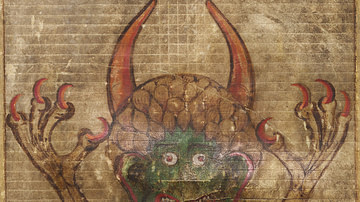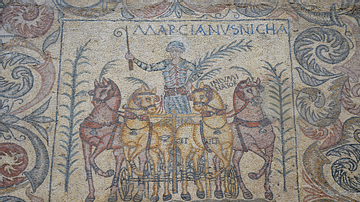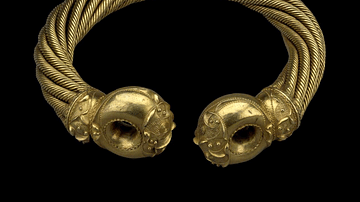Search
Did you mean: Claudius?
Search Results

Article
The Extent of the Roman Empire
Time has seen the rise and fall of a number of great empires - the Babylonian, the Assyrian, the Egyptian, and lastly, the Persian. Regardless of the size or skill of their army or the capabilities of their leaders, all of these empires fell...

Article
Emperor Titus' Sole Mistake - A Mysterious Deathbed Confession
A little over two years into his imperial administration, the Roman emperor Titus (r. 79-81 CE) and a retinue of followers traveled to the Sabine countryside for a respite. As they made the overland journey, Titus quickly realized something...

Article
The Origin of Satan
Satan, or the Devil, is one of the best-known characters in the Western traditions of Judaism, Christianity, and Islam. Surprisingly, this entity was a late-comer in the ancient world. Satan, as a totally evil being, is nowhere to be found...

Article
What happened to the Great Library at Alexandria?
Once the largest library in the ancient world, and containing works by the greatest thinkers and writers of antiquity, including Homer, Plato, Socrates and many more, the Library of Alexandria, northern Egypt, is popularly believed to have...

Article
The Ancient Celtic Pantheon
The ancient Celtic pantheon consisted of over 400 gods and goddesses who represented everything from rivers to warfare. With perhaps the exception of Lugh, the Celtic gods were not universally worshipped across Iron Age Europe but were very...

Article
Chariot Racing in Ancient Rome
Chariot racing was very big business in ancient Rome. There was a whole industry built around the factions, the four professional stables known by their team colour – Blue, Green, Red, and White –, providing all that was required for a race...

Article
Plague in the Ancient & Medieval World
The word 'plague', in defining a lethal epidemic, was coined by the physician Galen (l. 130-210 CE) who lived through the Antonine Plague (165 - c. 180/190 CE) but the disease was recorded long before in relating the affliction of the Plague...

Article
Ancient Celtic Torcs
In ancient Celtic cultures, torcs were a common form of jewellery and were made from bronze, copper, silver, and gold. Torcs were not just exquisite works of Celtic art but also identified the wearer’s status and perhaps were believed to...

Article
Was Cleopatra Beautiful?
The idea that Cleopatra VII (69-30 BCE), the famous last queen of ancient Egypt, owed her powerful position to her beauty persists. “The nose of Cleopatra: if it had been shorter, the whole face of the earth would have changed,” the French...

Article
Mark Antony's Parthian Campaign
In 36 BCE, Mark Antony (83-30 BCE) invaded Parthia, hoping to render himself one of the great conquerors of the Greco-Roman world, but he was stymied by Parthian forces and obliged to undertake an arduous, costly retreat. What to make of...